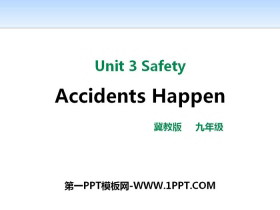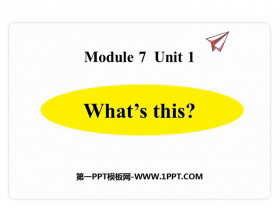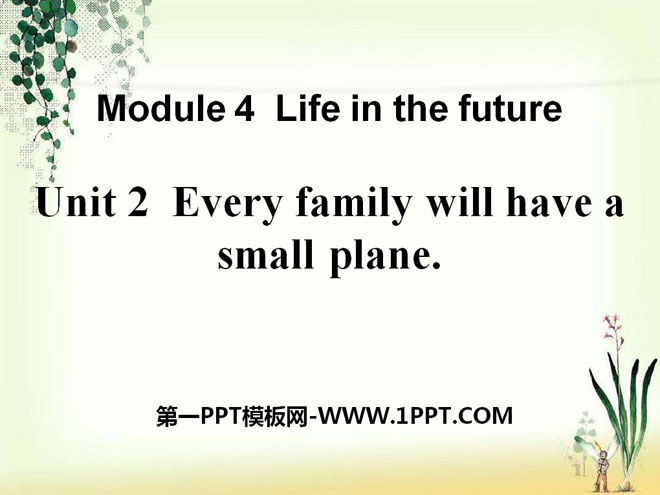
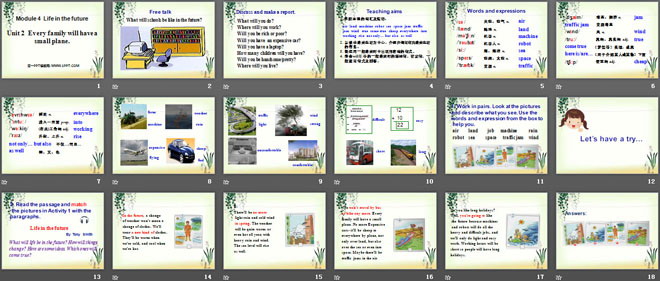
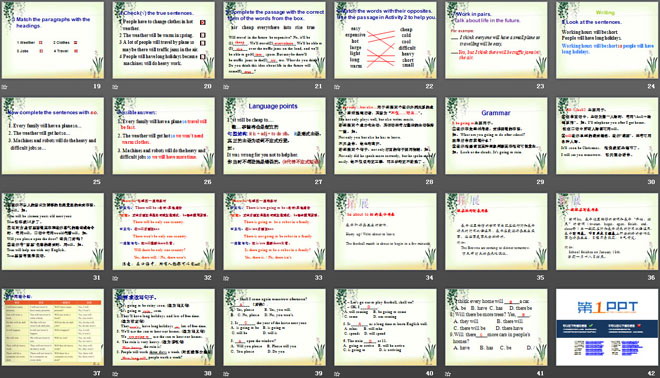
《Every family will have a small plane》Life in the future PPT课件2
Free talk
What will schools be like in the future?
Discuss and make a report.
What will you do?
Where will you work?
Will you be rich or poor?
Will you have an expensive car?
Will you have a laptop?
How many children will you have?
Will you be handsome/pretty?
Where will you live?
... ... ...
Teaching aims
1.掌握本课的词汇及短语:
air land machine robot sea space jam traffic jam wind true come true cheap everywhere into working rise not only… but also as well
2. 以谈论将来生活为中心,介绍并询问有关将来生活的信息。
3. 能运用一般将来时中出现形容词的句式。
4. 学会will引导的一般将来时的陈述句、否定句、一般疑问句式及回答。
Words and expressions
/εə / 天空;空气 n. air
/lænd/ 陆地 n. land
/mə'ʃi:n/ 机器 n. machine
/'rəubɔt/ 机器人 n. robot
/si:/ 海;海洋 n. sea
/speIs/ 空间;太空 n. space
/'træfIk/ 交通 n. traffic
... ... ...
1. Work in pairs. Look at the pictures and describe what you see. Use the words and expression from the box to help you.
air land job machine rain
robot sea space traffic jam wind
2. Read the passage and match the pictures in Activity 1 with the paragraphs.
Life in the future
What will life be in the future? How will things change? Here are some ideas. Which ones will come true?
A:
In the future, a change of weather won’t mean a change of clothes. We’ll wear a new kind of clothes.
They’ll be warm when we’re cold, and cool when we’re hot.
B:
There’ll be no more light rain and cold wind in spring. The weather will be quite warm or even hot all year, with heavy rain and wind.
The sea level will rise as well.
C:
We won’t travel by bus or bike any more. Every family will have a small plane. No more Expensive cars- it’ll be cheap to everywhere by plane, not only over land, but also over the sea or even into space. Maybe there’ll be traffic jams in the air.
... ... ...
Now complete the sentences with so.
1. Every family will have a plane so…
2. The weather will get hot so…
3. Machines and robots will do the heavy and difficult jobs so…
Possible answers:
1. Every family will have a plane so travel will be fast.
2. The weather will get hot so we won’t need warm clothes.
3. Machines and robots will do the heavy and difficult jobs so we will have more time.
... ... ...
Language points
1.it will be cheap to….
做…事情将会是便宜的
句型结构: it is + adj.+ to do sth,it是形式主语,
真正的主语为动词不定式后置。
如:
It was wrong for you not to help her.
你当时不帮助她是错误的。(it代替不定式短语)
2. not only…but also…用于连接两个表示并列关系的成分,着重强调后者,其意为“不仅……而且…”;
She not only plays well, but also writes music.
若连接两个成分作主语,其谓语通常与靠近的主语保持一致。如:Not only you but also he has to leave.
不只是你,他也得离开。若连接两个句子,not only后面的句子要用倒装,如:Not only did he speak more correctly, but he spoke more easily. 他不仅说得更正确,而且讲得更不费劲了 。
... ... ...
Grammar
1.be going to主要用于:
①表示事先经过考虑、安排要做的事情。
如:What are you going to do after school?
放学后你打算做什么?
②表示根据前面某种迹象判断某事很有可能发生。
如:Look at the clouds. It’s going to rain.
2. will(shall)主要用于:
①在书面语中,主语为第一人称时,常用“shall+动词原形”。如:I’ll telephone you after I get home.
但在口语中所有人称都可用will。
②will表示单纯的将来概念,表示“将要”,通常可用各种人称。
It’ll soon be Christmas.很快就到圣诞节了。
I will see you tomorrow.明天我去看你。
③表示不以人的意志为转移的自然发展的未来事情,用will。如:
Tom will be sixteen years old next year.
Tom明年就16岁了。
④问对方是否愿意做某事和表示客气的邀请或命令时,常用will。口语中常用would代替will。如:
Will you please open the door? 请关门好吗?
⑤表示带“意愿”色彩的将来时,用will。如:Tom will help me with my English.
Tom愿意帮我学英语。
... ... ...
“There be”句型的一般将来时
肯定句: There will be +名词+其他成份
[注意]:无论后面加单数名词或复数形式,be都必须用原形。
There will be only one country.
否定句:在will后面加not.
There won’t be only one country.
一般疑问句:把will提到there之前。
Will there be only one country?
Yes, there will. / No, there won’t.
... ... ...
拓展
be about to 结构表示将来
表示即将要发生的动作.
Hurry up! We're about to leave.
The football match is about to begin in a few minutes.
现在进行时表将来
表示位置转移的动词常与现在进行时和表示将来的时间状语连用,表示在最近将要发生某事。这些事是事先安排好的。
例如:The Browns are coming to dinner tomorrow.
明天布朗夫妇要来吃晚饭。
一般现在时表将来
动词be;表示位置转移的动词和表示“开始,结束”的动词(如start,begin,open,finish,end,close等)与一般现在时和表示将来的时间状语连用,表示时间表、节目单或日程表上所安排好的动作或事态将要发生,日程不易改变,口气肯定。
例如:School finishes on January 18th.
学期一月十八日结束。
... ... ...
按要求改写句子。
1. It’s going to be rainy soon. (改为同义句)
It’s going to _____ soon.
2. They’ll have long holidays and lots of free time. (改为否定句)
They _____ have long holidays ___ lots of free time.
3. We’ll use the sun to heat our homes. (改为同义句)
We ______ use the sun to heat our homes.
4. The rain is very heavy. (改为感叹句)________ the rain is!
5. People will work three days a week. (对划线部分提问)________ people work a week?
... ... ...
1.– Shall I come again tomorrow afternoon?
–________ (好的).
A. Yes, please B. Yes, you will.
C. No, please D. No, you won’t.
2. It ________ the year of the horse next year.
A. is going to be B. is going to
C. will be D. will is
3. _____ open the window?
A. Will you please B. Please will you
C. You please D. Do you
4. – Let’s go out to play football, shall we?
– OK. I ________.
A. will coming B. be going to come
C. come D. am coming
5. It ________ us a long time to learn English well.
A. takes B. will take
C. spends D. will spend
6. The train ______ at 11.
A. going to arrive B. will be arrive
C. is going to D. is arriving
... ... ...
关键词:《Every family will have a small plane》教学课件,外研版七年级下册英语课件,七年级英语幻灯片课件下载,《Every family will have a small plane》PPT课件下载,.ppt格式








